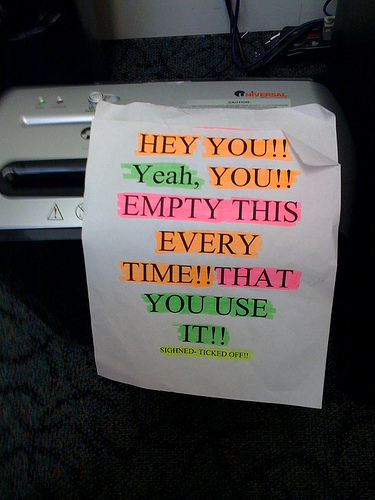 Here’s a story that should make you think twice the next time you reach for your cell phone on a crowded train or in a waiting room.
Here’s a story that should make you think twice the next time you reach for your cell phone on a crowded train or in a waiting room.
According to AbovetheLaw.com, a law firm partner was on a train en route to New York when he whipped out his Bluetooth headset. He proceeded to discuss private corporate matters—specifically, the decision to lay off 15-20 workers at Pillsbury Winthrop, citing the names of the employees getting the chop—over the phone, for all of his fellow passengers to hear. As it turns out, a law student overheard the loud conversation, and reported it to Above the Law, which tracked down the caller’s name and firm. Long story short: Pillsbury now has egg on its face for its inappropriate handling of private matters.
This is just another instance of people’s lack of common courtesy and professionalism when it comes to cell phone use. Not only is your conversation disturbing the people around you, but you could be inadvertently sharing information you don’t want made public. Cell phones are designed to make our lives easier, yes, but they need to be used with care. Do so by adhering to these rules of etiquette:
1) Heed the Signs. Many buildings (such as doctor’s offices, movie theaters, etc.) are now posting notices asking visitors to turn off their cell phones. Please play by the rules. And never, ever answer your cell phone during a movie—you’ll be begging for trouble! The same goes for churches—who wants to be the person in the front pew with the jazzy ring tone going off?
2) The Waiting Game. How many times have you been stuck in a long line at the post office or bank while the person at the counter tries to juggle a phone conversation and their business at the same time? It’s aggravating not only for the people who are waiting behind you, but also the service rep trying to assist you. Nobody wants to talk to a person with a phone glued to their ear, so stop wasting their time. Let the call go to voice mail until you have completed your transaction; if the call is important and absolutely can’t wait, kindly step to the side and let the person behind you take your place.
3) Keep It Down. When conducting a conversation on your cell phone, keep the volume low. People who use Bluetooth headsets especially seem to have trouble gauging how loud they are speaking. There’s no need to shout!
4) Change Your Tone. It’s one thing for your phone to go off in the middle of an important meeting. But can you imagine how humiliating and unprofessional it would be if your ring tone was a cheesy pop song? Always, always, always put your phone on silent or at the very least vibrate (in your pocket or handbag, not on the table where it can be seen) when sitting down for a business meeting.
5) Don’t Pick Up. Likewise, answering your phone during dinner is seen as bad form. Turn the phone to silent, and let calls go to voice mail. If you feel the call might be vital (for instance, it’s from the babysitter watching your children), excuse yourself and take the call outside or in an area of the restaurant where you will not disturb other diners.
6) Bathroom Breaks. I can never understand why people feel the need to carry on a phone conversation while in a bathroom! It’s just plain unhygienic and disturbing, not only to the person you are speaking with, but to the other people in the bathroom who can hear you. Take care of business, then make your call.
 If you find yourself with some time to kill—not on company time, mind you—direct your web browser to
If you find yourself with some time to kill—not on company time, mind you—direct your web browser to  Happy Early Valentine’s Day!
Happy Early Valentine’s Day! 